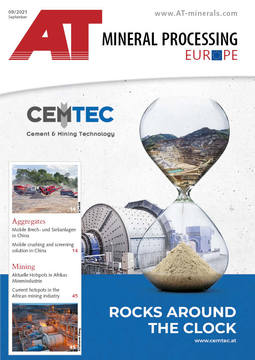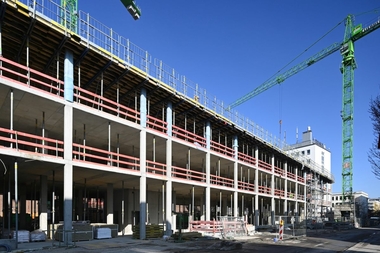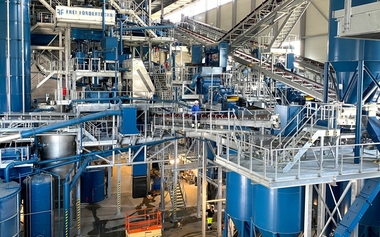Recycling and primary raw materials associations call for technology-open tenders
There is a long-term demand for primary and recycled mineral raw materials for the entire construction sector (residential construction, commercial construction, infrastructure projects, etc.) and as a basic material for industrial processes. The annual demand for aggregates in Germany is around 590 million t. Recycled aggregates processed from mineral construction waste are used for this purpose, as are primary products from quarries and gravel pits.
“Recycled building materials are used in a wide variety of applications,” says Michael Stoll, Chairman of the Bundesvereinigung Recycling-Baustoffe e. V. “Mineral construction waste is turned back into valuable construction raw materials by collecting it as separately as possible according to material groups and carefully processing it. Of the approximately 220 million t of construction waste generated annually, about 90 % is recycled in accordance with the Closed Substance Cycle Waste Management Act and remains in the material cycle. Technologically and material-wise, about 73 million t of high-quality recycled aggregates can be produced from the masses suitable for recycling. This covers about 12.5 % of the annual demand for aggregates for the entire construction sector. Recycled building materials thus form a valuable supplement to the supply of primary building materials.”
Dr. Gerd Hagenguth, President of the Bundesverband Mineralische Rohstoffe e.V., also sees no competition between building materials. “Today, 90 % of rock raw materials are already recycled. Processing and utilisation processes of mineral primary and recycled raw materials complement each other. In many companies that extract primary raw materials such as sand, gravel and natural stone, road excavation, demolition and soil materials are also processed in parallel and sold as quality-controlled recycling products. This means that gravel pit and quarry operators are often both producers and suppliers of mineral recycling products.”
In the processing of primary as well as mineral demolition material, questions of transport distances, available quantities with consistent properties, and energy and water consumption for processing play a role. The aspect of availability close to demand has the greatest influence on sustainability and thus on the recycling of mineral construction waste. This applies equally to the generation, processing and sales opportunities. An ideal variant is road construction measures in which the excavated road material is processed close to the construction site and directly reinstalled, because the transport costs for heavy bulk goods quickly exceed the value of the goods. Transport distances and the resulting transport costs are thus the biggest regulator for the attractiveness of the application. Consequently, the higher the degree of urbanisation, the more profitable the processing and use of RC materials. In metropolitan regions, demolition, processing and reuse sites are usually closer together than in rural areas, and: “A positive effect is that there are about 3000 extraction sites for rock raw materials in Germany, which, distributed decentrally, can process accumulating demolition material,” says Dr. Gerd Hagenguth, explaining the possibilities in interaction with the many rock companies experienced in recycling.
Michael Stoll and Dr. Gerd Hagenguth agree that it makes no sense to position the advantages and disadvantages of both groups of building materials against each other, since a strong coexistence has long since developed. Instead, both call for RC building materials to be given a boost through technology-open and neutral tenders. “For public tenders, product neutrality has already been fixed in the VOB/A for more than 10 years and RC building materials are to be preferred to primary raw materials according to the Closed Substance Cycle Waste Management Act if they are technically equally suitable,” says Michael Stoll. “Unfortunately, these aspects are still applied too hesitantly in public procurement. Although this will not change the absolute amount of substitution of primary materials by RC materials, because only as much can be recycled and used as is available from deconstruction measures, it does result in a clear image enhancement.”






